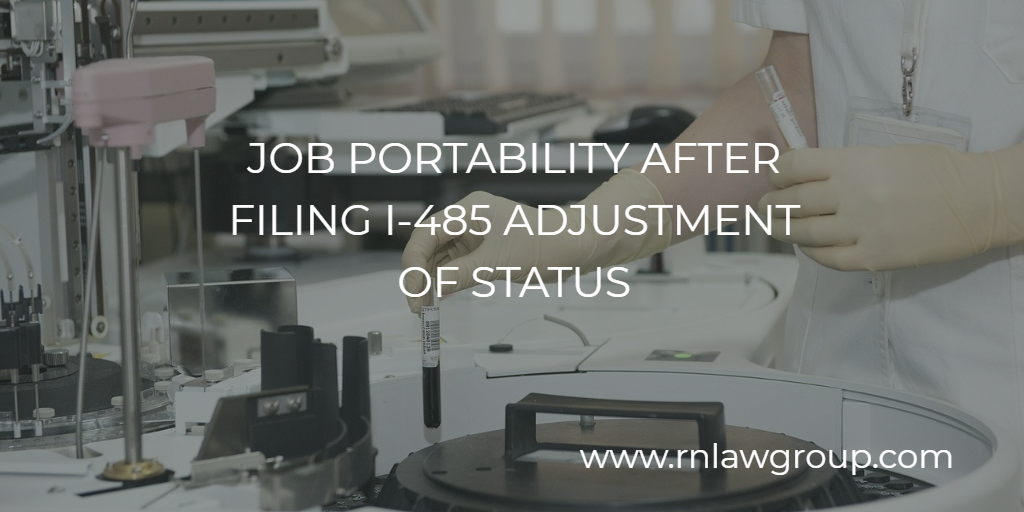
Job Portability after Filing I-485 Adjustment of Status
In 2000, Congress enacted the American Competitiveness in the Twenty-First Century Act of 2000 (AC21), which allows certain employment-based adjustment of status applicants experiencing delays in the employment-based adjustment of status process some flexibility to change jobs or employers while their Application to Register Permanent Residence or Adjust Status (Form I-485) is pending.
To qualify for “portability” under AC-21, the adjustment applicant must meet the following eligibility requirements:
- The applicant is the beneficiary of an approved Form I-140 petition or of a pending petition that is ultimately approved;
- The petition is filed in the EB-1, EB-2, or EB-3 category;
- The applicant’s properly filed adjustment application has been pending with USCIS for 180 days or more;
- The new job offer is in the same or similar occupational classification as the job specified in the petition; and
- The applicant submitted a Confirmation of Bona Fide Job Offer or Request for Job Portability Under INA Section 204(j) (Form I-485 Supplement J).
To determine whether a new job offer is valid for purposes of AC-21 portability, the new job offer must be in either the same occupational classification or a similar occupational classification as the job specified in the underlying Form I-140 petition. The new job offer may be with the same petitioner or with an entirely new employer, including self-employment.
The term “similar occupational classification” means an occupation that shares essential qualities or has a marked resemblance or likeness with the occupation for which the underlying employment-based immigrant visa petition was approved. A change to the same or a similar occupational classification may involve lateral movement, career progression, or porting to self-employment, either in the same or a different geographic location.
To determine if the new job offer is in the same or similar occupational classification as the job listed on the petition, USCIS officers evaluate the totality of the circumstances. As part of this evaluation, officers may consider and compare various factors and evidence relating to the jobs. Relevant factors include, but are not limited to:
- The U.S. Department of Labor (DOL) occupational codes assigned to the respective jobs;
- Job duties;
- Job titles;
- The required skills and experience;
- The educational and training requirements;
- Any licenses or certifications specifically required;
- The offered wage or salary; and
- Any other material and credible evidence relevant to a determination of whether the new position is in the same or a similar occupational classification.
Standard Occupational Classification (SOC) codes may help address uncertainty in the portability determination process, but USCIS does not consider SOC codes or their descriptions as the sole determining factor. If the applicant establishes by a preponderance of the evidence that the detailed occupational codes describing the original and new positions are the same (for example, those where all six digits of the code match), and the totality of the circumstances supports that determination, officers may generally treat such evidence favorably in determining whether the two positions are in the same or similar occupational classification(s) for INA 204(j) portability purposes. Similarly, USCIS generally considers two jobs described by two distinct detailed occupation codes within the same broad occupation code as being similar occupational classifications unless the preponderance of the evidence indicates otherwise.
USCIS also recognizes that persons earn opportunities for career advancement as they gain experience over time. USCIS considers cases involving career progression under the totality of the circumstances to determine whether the applicant has established by a preponderance of the evidence that the relevant positions are in similar occupational classifications for AC-21 portability purposes.
In many instances, a person’s progress in his or her career may easily fit the standards above, such as when a person moves into a more senior but related position that does not have a managerial or supervisory role (such as a promotion from a software engineer to a senior software engineer). In such cases, USCIS considers whether the original position and the new position are in the same or similar occupational classification based on the factors above.
In other instances, career progression may involve a different analysis, such as when a person moves from a non-managerial or non-supervisory position into a managerial or supervisory role. AC-21 portability may be available in cases where the applicant’s new position is primarily responsible for managing the same or similar functions of their original jobs or the work of persons whose jobs are in the same or similar occupational classification(s) as the applicants’ original position. For example, if the occupation described in the original job offer was assigned the SOC code of 15-1152 for Software Developers, officers may determine that a new job offer described in the SOC code of 11-3021 for Computer and Information Systems Managers is in a similar occupational classification.
There may also be instances where normal career progression does not involve managing persons in jobs that are in the same or similar occupational classification(s) as the applicant’s original position. Here, AC-21 portability may be available if an applicant is overseeing some of the functions of the original job, such that the two positions are in similar occupational classifications.
In all cases that involve career progression, USCIS considers the totality of the circumstances to determine whether the preponderance of the evidence establishes that the two positions are in similar occupational classifications for AC-21 portability purposes.
Even in cases where SOC codes are not grouped together or the relevant positions do not reflect normal career progression, USCIS may still find under the totality of the circumstances that the two jobs can be considered to be in the same or similar occupational classification(s). If the preponderance of the evidence indicates that the two jobs share essential qualities or have a marked resemblance or likeness, the person may be eligible to port to the new position.
USCIS also recognizes that variations in job duties arising from performing jobs for different employers, including employers in different economic sectors, do not necessarily preclude two positions from being in similar occupational classifications for purposes of AC-21 portability.
USCIS may consider the wages offered for the original position and the new position in determining whether the two positions meet the requirements for AC-21 portability. The mere fact that both positions offer similar wages is not conclusive evidence to establish that the two positions are in the same or similar occupational classification(s). Likewise, a difference in salaries alone would not necessarily eliminate eligibility for AC-21 portability.
USCIS recognizes that normal raises occur through the passage of time to account for inflation or promotion. USCIS also recognizes that there may be differences in pay due to varying rates of pay in different economic sectors or geographic locations, as well as other factors, such as corporate mergers, size of employer, or differences in compensation structure. Additionally, there could be differences in wages in cases involving moves from for-profit employers to nonprofit employers, academic institutions, or public employers (or vice versa).
If a job change is on the horizon while an I-485 application for adjustment of status is pending, speak to a Reddy & Neumann attorney to verify that all requirements of AC-21 will be met.
By: Emily Neumann
Emily Neumann is Managing Partner at Reddy Neumann Brown PC with 15 years of experience practicing US immigration law providing services to U.S. businesses and multinational corporations. Emily has been quoted in Bloomberg Law, U.S. News & World Report, Inside Higher Ed, and The Times of India on various hot topics in immigration. She is a member of the American Immigration Lawyers Association and HR Houston.

